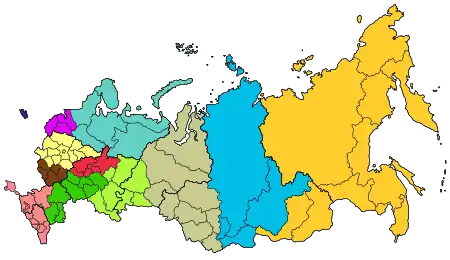Economic regions of Russia
Russia is divided into twelve economic regions (Russian: экономи́ческие райо́ны, ekonomicheskiye rayony, sing. ekonomichesky rayon)—groups of federal subjects sharing the following characteristics:
- Common economic and social goals and participation in development programs;
- Relatively similar economic conditions and potential;
- Similar climatic, ecological, and geological conditions;
- Similar methods of technical inspection of new construction;
- Similar methods of conducting customs oversight;
- Overall similar living conditions of the population.

No federal subject can belong to more than one economic region.
Economic regions are also grouped into economic zones (also called "macrozones"). An economic region or its parts can belong to more than one economic zone.
Establishment and abolition of economic regions and economic zones or any changes in their composition are decided upon by the federal government of Russia.
This division into economic regions is different from the division into federal districts. The former are solely for economic and statistical purposes, and the latter exist solely to uphold the federal laws on the territory of the country.
Table
| Economic region | Population (2020) | Area (km2) |
|---|---|---|
| Central | 32,310,000 | 482,300 |
| Central Black Earth | 7,123,000 | 167,900 |
| East Siberian | 6,119,000 | 3,371,800 |
| Far Eastern | 6,122,000 | 6,952,600 |
| Kaliningrad | 1,013,000 | 15,100 |
| North Caucasus | 22,629,000 | 381,600 |
| Northern | 4,473,000 | 1,476,600 |
| Northwestern | 8,497,000 | 195,200 |
| Ural | 18,699,000 | 823,300 |
| Volga | 15,807,000 | 539,800 |
| Volga-Vyatka | 7,153,000 | 264,800 |
| West Siberian | 14,756,000 | 2,454,000 |
List and composition of the economic regions
The following is the list and composition[1] of the economic regions, sorted by population.
- Central Black Earth (Центрально-Чернозёмный, Tsentralno-Chernozyomny)
- Central (Центральный, Tsentralny)
- Bryansk Oblast
- Ivanovo Oblast
- Kaluga Oblast
- Kostroma Oblast
- Moscow (federal city)
- Moscow Oblast
- Oryol Oblast
- Ryazan Oblast
- Smolensk Oblast
- Tula Oblast
- Tver Oblast
- Vladimir Oblast
- Yaroslavl Oblast
- East Siberian (Восточно-Сибирский, Vostochno-Sibirsky)
- Far Eastern (Дальневосточный, Dalnevostochny)
- Amur Oblast
- Buryat Republic
- Chukotka Autonomous Okrug
- Jewish Autonomous Oblast
- Kamchatka Krai
- Khabarovsk Krai
- Magadan Oblast
- Primorsky Krai
- Sakha
- Sakhalin Oblast
- Zabaykalsky Krai
- Kaliningrad (Калининградский, Kaliningradsky)
- North Caucasus (Северо-Кавказский, Severo-Kavkazsky)
- Adygea
- Chechen Republic
- Crimea
- Dagestan
- Ingushetia
- Kabardino-Balkar Republic
- Karachay–Cherkess Republic
- Krasnodar Krai
- North Ossetia–Alania
- Rostov Oblast
- Sevastopol (federal city)
- Stavropol Krai
- Northern (Северный, Severny)
- Northwestern (Северо-Западный, Severo-Zapadny)
- Ural (Уральский, Uralsky)
- Bashkortostan
- Chelyabinsk Oblast
- Kurgan Oblast
- Orenburg Oblast
- Perm Krai
- Sverdlovsk Oblast
- Udmurt Republic
- Volga (Поволжский, Povolzhsky), the traditional name of the region, meaning "the area by the Volga River"
- Astrakhan Oblast
- Kalmykia
- Penza Oblast
- Samara Oblast
- Saratov Oblast
- Tatarstan
- Ulyanovsk Oblast
- Volgograd Oblast
- Volga-Vyatka (Волго-Вятский, Volgo-Vyatsky)
- West Siberian (Западно-Сибирский, Zapadno-Sibirsky)
References
- Russian Classification of Economic Regions (OK 024-95) as amended by #5-2001